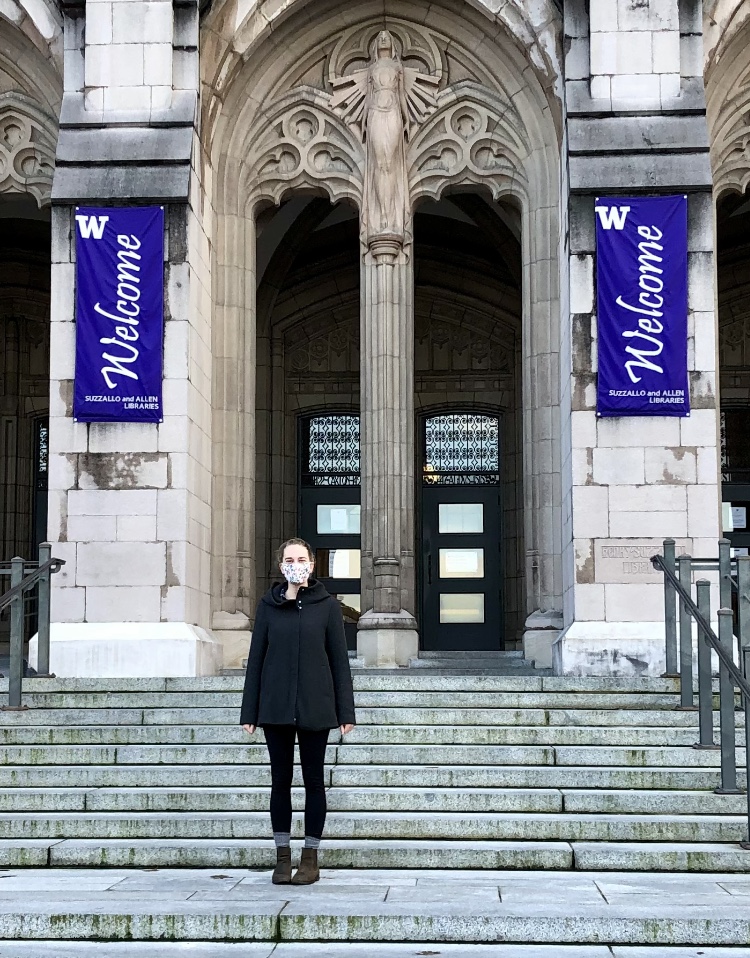This is the fifth in a series of interviews with the 2022 MLStEP board. We will be sharing new interviews with our officers and liaisons in the weeks leading up to the Music Library Association Conference in early March.
Emma Clarkson (she/her) is starting her first term as the MLStEP Web Technologies Officer. She is in the second year of her MLIS at the University of Washington and works in the Preservation Department at the UW Libraries.
What are your areas of interest in music librarianship? I have a background in stage management and arts administration, but during my MLIS I have focused on digital preservation and archives. I’m hoping to pursue work that brings together those two areas, either in a performing arts archives or through digital preservation and metadata work at a music library.

University of Washington
Why did you choose librarianship as a career path? It’s a recent and serendipitous career change for me! I was working in arts administration in 2020, when the pandemic shut down the performing arts world completely. I decided to seize the opportunity to change directions and apply to grad school, and I’m so glad I did. While my first year was entirely remote, I still learned so much and enjoyed the MLIS; then, when the Libraries started hiring again, I was able to add hands-on experience in a student job and an internship, which has made me very excited about working in this field.
What was your favorite part of library school? My favorite part of library school has been my internship in the Preservation Department. It’s been an incredible opportunity to work alongside Libraries staff, learning and assisting with the whole range of preservation activities, from conducting an acetate film condition survey in Special Collections, to digitizing a hundred-year-old doctoral dissertation, to disk imaging legacy digital media, to integrated pest management. I’ve enjoyed every part of it!
Another favorite experience has been my Capstone project: I’m learning the basics of music cataloging in order to do original and copy cataloging for a historic collection of Mozart sound recordings on 78rpm shellac discs. It has been an incredible opportunity to handle these rare materials from the acoustical recording era, learning RDA and MARC standards for weird, early-twentieth-century, minimally labeled items, many of which have no OCLC holdings.
What has been your best experience as a member of MLA and/or MLStEP? I’m new to MLStEP and looking forward to getting to know my fellow members in the next few months. I would have to say that my favorite experience of MLA so far is just lurking on MLA-L and getting a sense of what the broader professional conversation is like!
What advice would you give to a beginning library student? Get as much out-of-the-classroom experience as you can during school—internships, student jobs, volunteering if it’s feasible for you, research, whatever sparks your interest! One of the most rewarding things for me has been to choose courses based on what I’m learning in my student job and then apply what I learn in class to my work. I feel like I’m building a coherent body of skills and kickstarting my career, while also staying engaged with my coursework.
Do you have anything else to add? My other piece of advice would be to subscribe to all the listservs for the communities of practice relating to your coursework. I joined AUTOCAT when I took Cataloging, GOVDOC-L when I took Goverment Publications, and so on. I set inbox rules so they go straight to designated folders: that way, without swamping your inbox, you can skim a few weeks at a time and really get a sense of what’s going on beyond the limits of the syllabus.
Use the buttons below to connect with Emma. Stay tuned for the next interview!